Today’s blog entry is about the country Georgia, the 11th to the 18th century (1000-1700) will only be discussed briefly. Not to be mixed up with the US State of Georgia which was founded in 1732 (named after King George II. who lived from 1683 to 1760). The 19th to 21st century will be discussed in more detail, it is followed up by the recent protests against the Russian-inspired law.
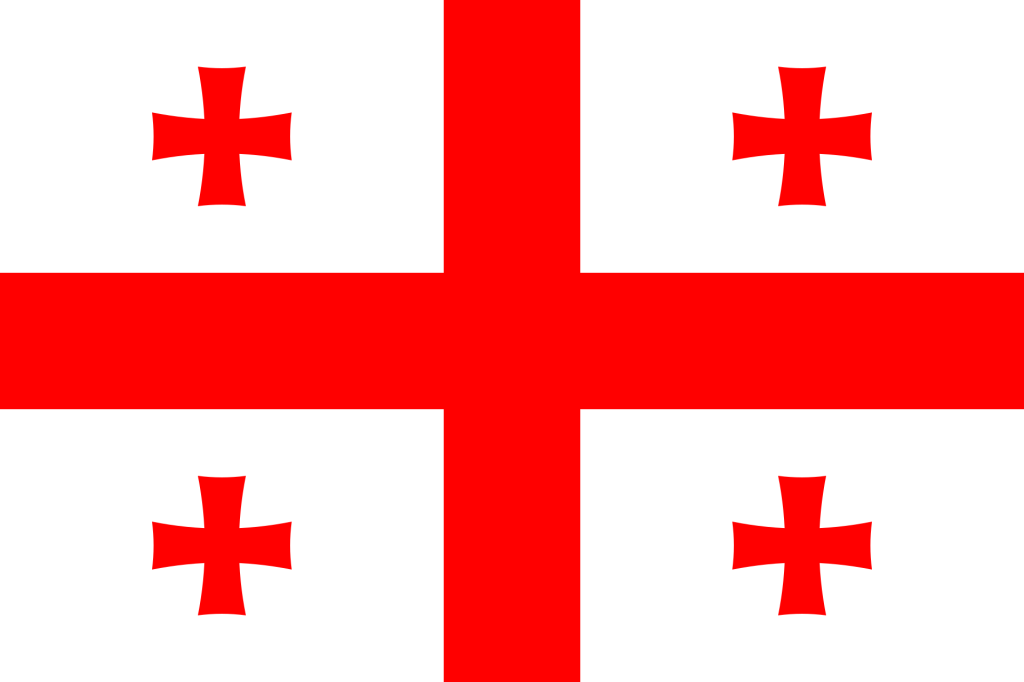
(Image source: Wikipedia)
Geographic Location
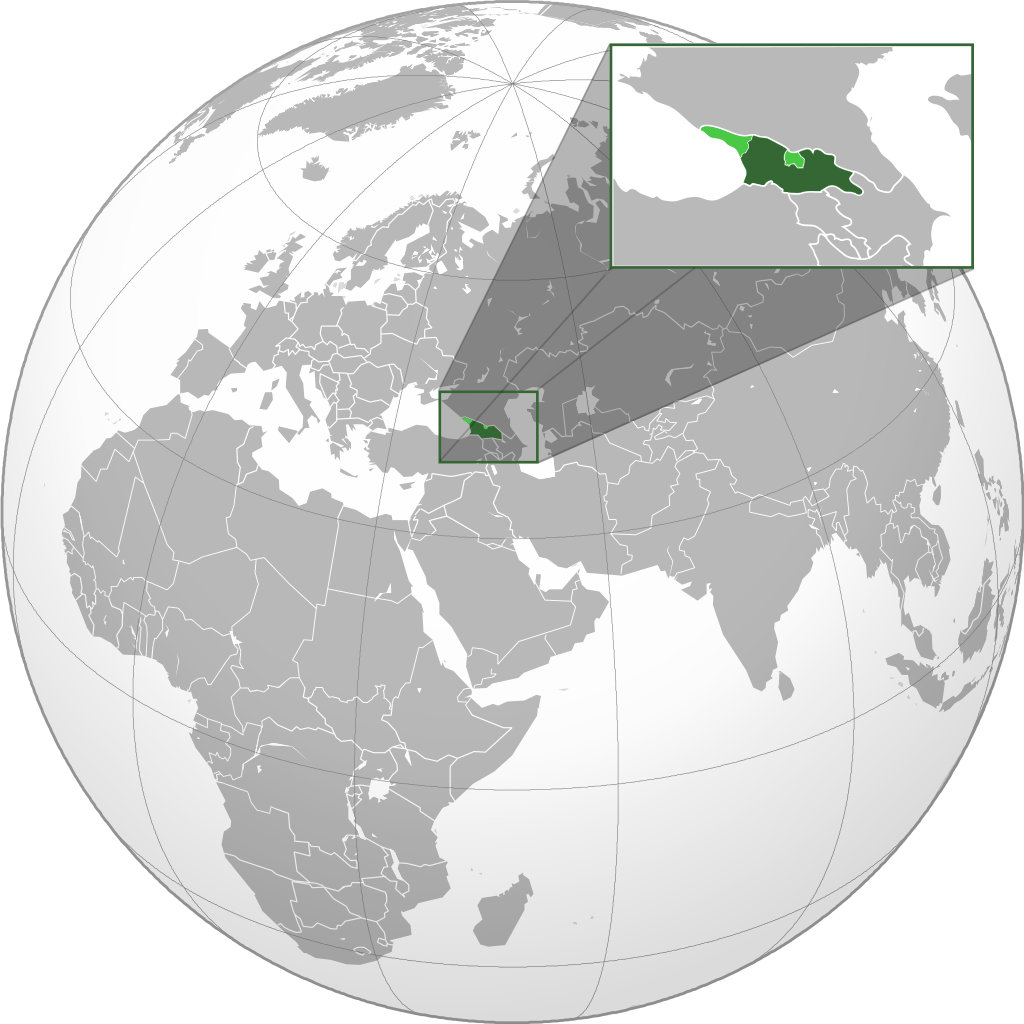
Georgia is a country located in Eastern Europe and West Asia.
You may have heard it in connection with the Caucasus region of which it is part of.
It shares borders with Russia to the north and northeast, Turkey to the southwest, Armenia to the south and Azerbaijan to the southeast. To the west, it is connected to the Black Sea.
Georgia covers an area of 69,700 km² (or 26,900 sq mi) – quite a bit larger than West Virginia with an area of 62,756 km² (or 24,230 sq mi).
Demography
It is estimated that, in 2024, 3,809,000 people live in Georgia.
I took the following graphs from the Encyclopedia Britannica, because they look better than those who I usually create in Excel. First the ethnic composition then the religious affiliations, however, they do not include Abhkazia and South Ossetia. Georgians call themselves Kartveli whereas Georgian is derived from their Persian name Gorj.
According to Encyclopedia Britannica, it is likely that Georgians have always lived in that region – known to them as Sakartvelo.
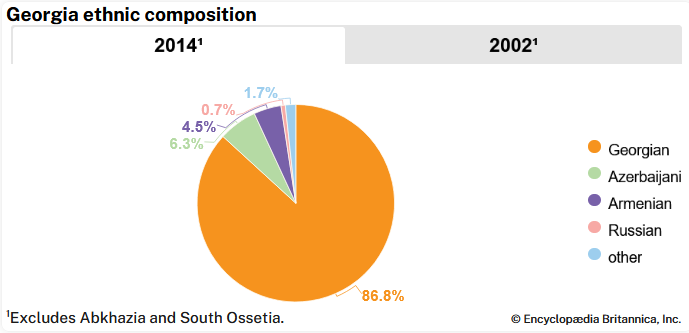
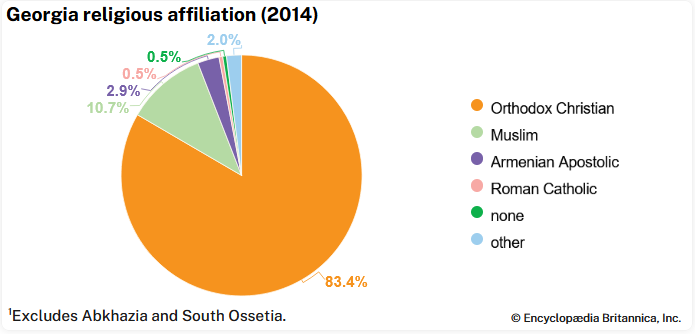
Old History (1000-1700)
As mentioned in the introduction, in this part we will only briefly discuss what happened during these 700 years. And by brief I mean brief, since this long time period – at least on a human scale – could fill many book shelves. The entire timeline is based on the BBCs one’s.
- 11th to 13th Century
Under the Bagrationi dynasty, the Georgian kingdom becomes politically unified.
The rule of this dynasty began in the early 9th century in southwestern Georgia and the adjacent Georgian marchlands reconquered from the Arabs. The Georgian kingdom was restored in 888 and it prospered from the 11th to the 13th century. The most notable rulers being David IV (1089 – 1125) and his great granddaughter Tamar (1184 – 1213), this time period is described as the „golden age“ in Georgian history. - c. 1220-1330s
The Mongols invade and occupy the Caucasus.
Here an excerpt on how the invasion began, the book is only in parts accessible:
„In November or early December 1220, two Mongol tümen arriving from Nakhchivan appeared in north-eastern Armenia, possibly searching for suitable winter pastures. Here they were opposed by Giorgi and Ivane with an army half their size. While the Georgians were defeated, they inflicted heavy losses on the invaders. The Mongols briefly retreated to the Mughan Steppe, only to resume their attack in January 1221.“
(source: History of the Caucasus: Volume 2: In the Shadow of Great Powers, p. 32)
King Giorgi IV Lasha would face the Mongols a second and a third time, with an army of 70,000 in both battles he still lost and the two Mongol generals defeated him in the last battle overwhelmingly due to superior tactical skills. While Giorgi escaped, he was badly wounded and the royal standing army ‚virtually annihilated‘. - 1299-1302
The Georgian kingdom was restored after George V of Georgia defeated the Mongols.
However, after his death the kingdom disintegrated politically and collapsed by the 15th century. Until the Russian annexation in the early 19th century, the Bagrationi house ruled the three breakaway kingdoms Kartli, Kakheti and Imereti. - 16th to 18th Century
The eastern and western parts of Georgia were subjugated by Ottoman Turkey and Safavid Iran (and successive Iranian Afsharid and Qajar dynasties). In the peace agreement of Amasya, Georgia was divided between the two: „Kakheti, Mosuki,
Akhaltsikhe, Akhalkalaki, Okros Tsikhe (also known as Altunkala), Borchalo, Kartli, Tbilisi, Gori, Surami, Meskheti were taken by Iran, and Bashiachuki (Imereti), Dadiani (Samegrelo), Guria, Part of Saatabago “ Dadeli (Tao), Ardahani, Artanuji, Oltisi, Tortumi were taken by the Ottoman State from the bank of the Chorokhi River to the border with Trabzon.“
(source: The Amasya Peace Treaty between the Ottoman Empire and Iran (June 1, 1555) and Georgia, Bulletin of the Georgian National Academy of Sciences, vol. 3 no. 1 2009, PDF-file which is 7 pages long)
Recent History (1800-2024)
- 1801-1804
Tsarist Russia annexes most of present-day Georgia.
Next to Georgia, the Russian Empire also annexed the other parts of Transcaucasia (aka the South Caucasus which includes Armenia, Georgia and Azerbaija) by the 1860s.
From 1815 to 1845, the Circassians of Abkhazia and the Lezgians from Dagestan were particularly fierce and the Russians could only „do little more than hold these mountain peoples at bay“ (Encyclopedia Britannica). It took until 1864 to completely pacify Dagestan. One year earlier, the Circassian genocide was carried out by Tsarist Russia:
„The corroboration between both Turkish and Russian documents puts the number of Circassian deaths by military operations and pre-planned massacres between 1.5 – 2 million; this is including those that disappeared, died from war, depopulation of villages, and instances of mass murder.[xxiii] Following the events of the genocide, the Russian census of 1897 recorded that there were only 150,000 Circassians remaining in the conquered region.[xxiv] The devastating events that unfolded resulted in the disappearance, death, or exile of 90-97% of the Circassian population.“ (The Circassian Genocide published in Journal of International Services) Georgia is the only country that recognized the case of the Circassians as genocide. - 1879
In the town of Gori Iosif Dzhugashvili, later known as Joseph Stalin (December 18, 1878 – March 5, 1953), was born.
The city Gori is one of the oldest Cities in Georgia, it was founded in the 7th century as Tontio. As I already mentioned, it was the hometown of the brutal dictator Stalin.
He spend his childhood in the city (1888-1894) and later studied at its theological seminary. After his death, it was a source of local pridge for the city. In 2010, the last monument to him was removed. Nowadays, Gori’s two main industries are food preservation from locally grown fruit and vegetables and the textil industry which gets its cotton largely from Azerbaijan. As of 2016, there live around 48,300 people. - 1918
In wake of the Russian revolution, Georgia declares its independency. - 1921
Three years later, the Red Army invades Georgia and absorbs it into the merging Soviet Union. - 1956
The Soviet leader Nikita Khrushchev implements his de-Stalinisation policy which turned violent and sparked protests as a result, calls for the succession become public.
The protest is brutally crushed by Soviet forces.
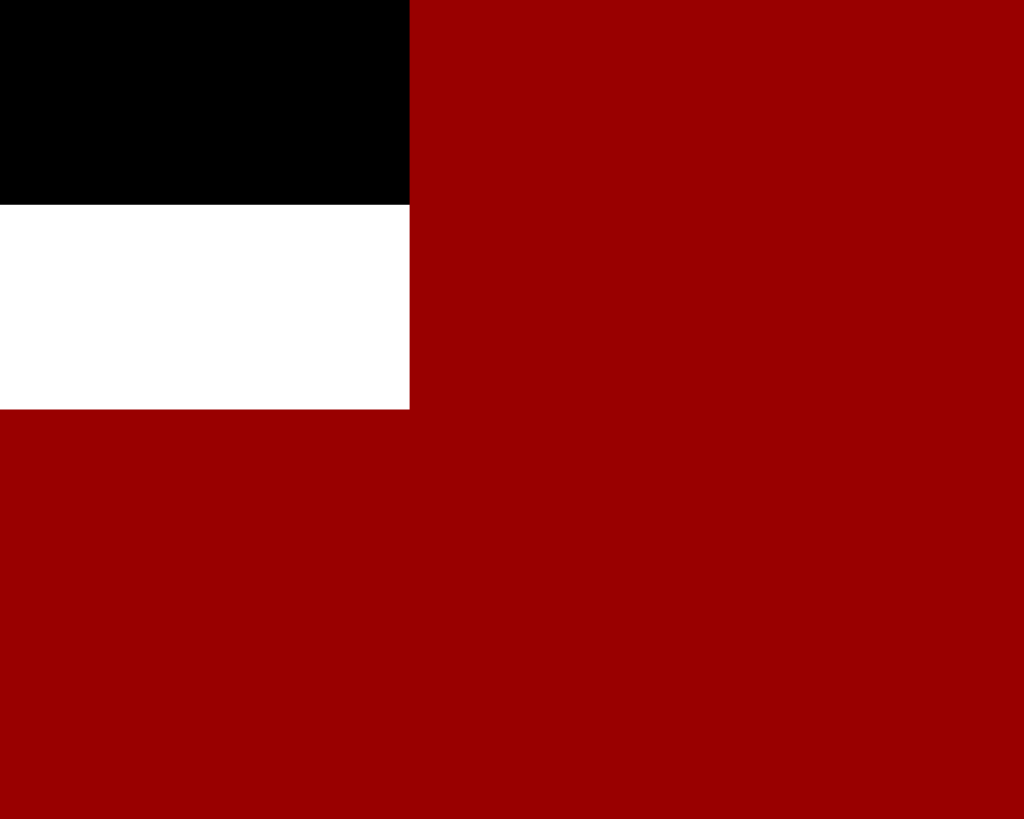
The short-lived independence was recognized de jure by Russia in the Treaty of Moscow (1920), it turned out that the treaty was merely a delaying tactic by the Bolsheviks to overthrow the Menshevik government.
- 1989
In South Ossetia, demands for more autonomy lead to violent clashes between Georgians and Ossetians. Soviet – later Russian – peacekeepers are deployed.
In the same year, the South Ossetian Supreme Soviet „announced its intention to turn the South Ossetian Autonomous Region into an Autonomous Republic“. Tbilisi rejected it and when South Ossetia turned to Moscow in August 1990 it was unsucessful as well. - 1990-1993
September 20, 1990: South Ossetia declaration of state sovereignty.
October 1990: Georgian parliamentary boycotted by South Ossetia.
December 1990: South Ossetia holds its own parliamentary elections.
Tee Georgian Supreme Soviet removed South Ossetia’s status as an autonomous republic.
January 1991: Prior to the break-up of the Soviet Union, the conflict between the two flares up in violence. By the end of the conflict 1,000 people were dead and 60,000 displaced.
March 17, 1991: Vote within the Soviet Union about a reformed Union. Unlike the Georgians, the population in Ossetia voted in favour.
April 9, 1991: Georgia declares its independence from the Soviet Union and Zviad Gamsakhurdia was elected the first president of Georgia. He, however, failed ‚dramatically‘ in finding a diplomatic solution for the conflict.
1992: In Spring heavy fighting broke out again, only after Shevardnadze became president both parties found their way back to the negotiating table. On June 10, Shevardnadze met then-Russian president Boris Yeltsin in Kasbegi to discuss ways of solving the Georgian-South Ossetian conflic. Two weeks later, the Sochi Agreement was signed. It also included Joint Peacekeeping Forces (JPKF) consisting of Georgian, Russian (including North Ossetian), and South Ossetian units. Russia took on the role as chief mediator in the following conflict-resolution process.
1992-1993: Georgian-Abkhazia War. Georgia sends troops to halt moves for succession.
Georgian forces are expelled at the end and up to 30,000 people are killed.
Before the war, Georgians made up almost half of Abkhazia’s population; 250,000 were expelled which basically halved Abkhazia’s population.
(Detailed 1990 to 1992 source: The Georgian-South Ossetian Conflict by Marietta König, published in 2004 – it’s a PDF file and quite informative, p. 4 also includes the background starting in 1918 with the establishment of the short-lived republic) - 1994
Ceasefire agreement between the Georgian government and Abkhazian separatists.
It paved the way to deploy the Russian peacekeeping force in the region.
The full-scare war claimed the lives of 12,000 people and nearly 250,000 Georgians had to flee their homes. - 2001
Clashes in Abkhazia between Abkhaz troops and Georgian paramilitaries, the latter being backed by fighters from the North Caucasus.
Russia accuses Georgia of harbouring Chechen rebels (in 1999, the second Chechen war began -> see Chechnya profile), a charge dismissed by Georgia. Tensions increase. - 2004
Clashes between Georgian and South Ossetian forces result in several deaths. - 2006
In an unrecognized referendum, South Ossetia votes in favour of independence.
„Ossetians have sought secession for more than a decade, and want to join neighbouring Russia.
Bella Pliyeva, the head of the province’s electoral commission, said 95% of the 55,000 population had been eligible to vote in the referendum, which asked voters whether they supported independence and the seeking of international recognition.
The US and European countries have said they will not recognise the result of the referendum, and no western monitors were present at the poll.“
(The Guardian, November 13 2006) - 2008
Georga tries to retake South Ossetia by force after low-level clashes with Russian-backed rebels. Tensions between Russia and Georgia escalate into a full-blown military conflict. The war lasts for five days and the counter-attacks of Russian forces push out Georgian troops out of South Ossetia and Abkhazi. France brokers a peace agreement.
South Ossetia and Abkhazi are recognized as independent states by Russia.
In Abkhaz the war also had repercussions on the view of both Georgians and Abkhazians: „Many in Georgia have since then viewed the conflicts in Abkhazia and South Ossetia as purely a Russian military occupation of Georgian territory and no longer acknowledge Abkhaz and South Ossetians as parties to the conflicts. The Abkhaz contest this, viewing increased military, economic and infrastructural support from Russia as necessary protection of their security. Ties were strengthened through the signing by Abkhazia and Russia of a treaty on ‘alliance and strategic partnership’ in November 2014, though on issues the Abkhaz perceive as challenging their sovereignty, there are signs of tension in the Abkhaz-Russian relationship.“ (Conciliation Resources) - 2014
Association Agreement between the European Union and Georgia is signed.
It was signed on 27 June. Here are some recent numbers (as of 2022):
– The EU is the main trade partner of Georgia. 20.5% of its trade takes place with the EU, followed by Turkey (14.6%) and Russia (13%).
– EU trade with Georgia accounts for 0.1% of its total trade, with a turnover of around €4.25 billion in 2022.
– EU exports to Georgia amounted to €3.2 billion in 2022, an increase of 57.9% compared to the previous year. The key export products are mineral products, machinery and appliances, and transport equipment.
– The key EU imports from Georgia include mineral products, chemical products, and textiles. The EU imported goods to the value of €1 billion from Georgia in 2022, with imports increasing by 25.8% since 2021.
(source: EU trade relations with Georgia)
And yes, here’s the agreement in case you want to read it:
https://eur-lex.europa.eu/legal-content/EN/TXT/?uri=CELEX%3A02014A0830%2802%29-20230306
It’s available in various languages, from English to Portuguese and Swedish. - 2015
In South Ossetia, Russian forces move the internal border inside Georgia proper by 1.5 km thus threatening main road linking west and east of country. - 2017
A presidential election and another referendum is held in South Ossetia.
This time, the referendum is about changing its name to the State of Alania as part of a plan to join the Russian Federation. - 2022
On February 24, Russia begins its war of aggression and illegal invasion of Ukraine.
Georgia becomes a temporary home for many Russian exiles.
On March 3, Georgia presented its application for EU membership.
On June 17, the European Commission presented its opinions on the applications for EU membership submitted by Ukraine, Georgia and the Republic of Moldova.
On June 23, Georgia was given an EU-membership perspective by unanimous agreement between all 27 EU-member states. - 2023
Prime Minister Irakli Gharibashvili (from February 22, 2021 to January 29, 2024) claims that NATO enlargement was one of the main reasons for Russia’s invasion of Ukraine, drawing domestic and international criticism. - 2024
The „transparency on foreign influence“ bill introduced in Georgia – also called the „foreign agents law“ as it is inspired by a similar Russian law – leads to protests in the capital Tbilisi.
„Under the legislation, media and non-governmental organisations that receive over 20% of their funding from abroad will have to register as „organisations acting in the interest of a foreign power“, submit themselves to stringent audits, or face punitive fines.“ (BBC)
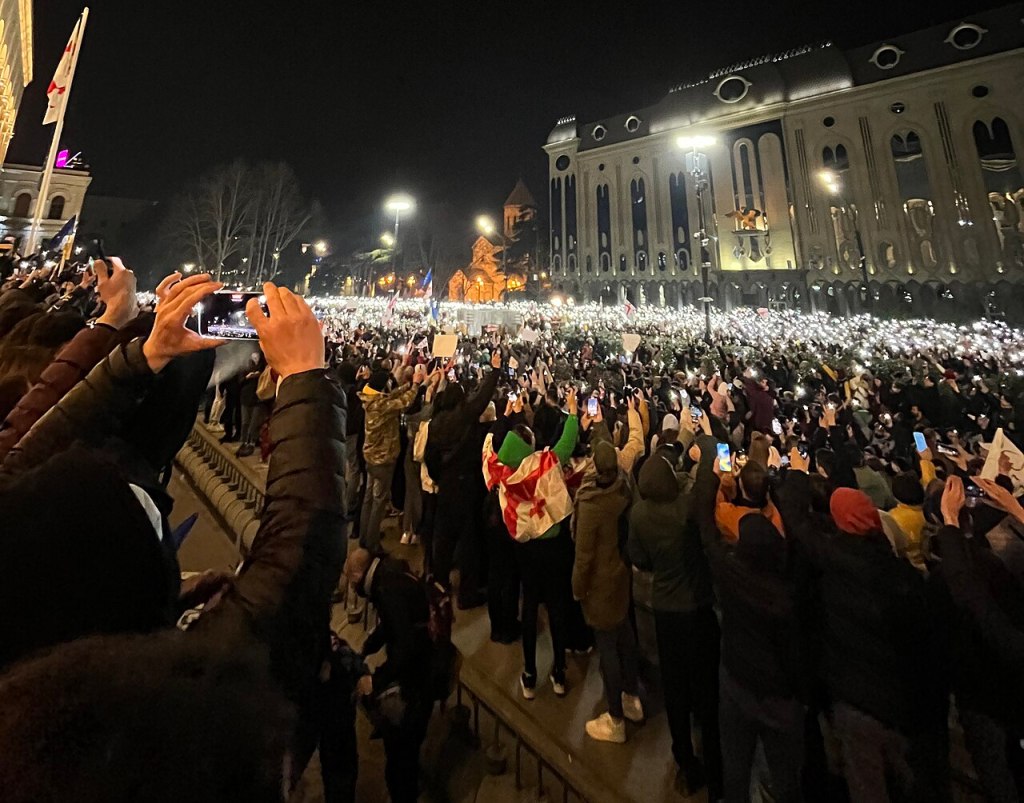
| The Ossetian People, An Excerpt from the paper „The Georgian-South Ossetian Conflict“ by Marietta König, published in the OSCE yearbook 2004. (source: https://ifsh.de/file-CORE/documents/yearbook/english/04/Koenig.pdf) |
| The Ossetians, who refer to themselves as Iron and to Ossetia as Iriston, are considered indigenous to the region as the indirect descendents of the north-east Iranian Scythians and Sarmatians. They are also the direct descendents of the Iranian Alans, a nomadic tribe that ruled the North Caucasus in the first four centuries A.D. before intermixing with other tribes in the area. The modern Ossetian people came into existence between the 16th and the 18th centuries. There are four main groups of Ossetians: Adagi, Kurtats, Tagaurs, and Digors, some of whom have merged with other North Caucasian tribes, as in the case of the Digors, who merged with the Kabards, or have split into smaller tribes, leading to the development of many Ossetian dialects. The Ossetians are thus by no means a homogenous people. Despite close relations between North and South Ossetia based on kin, both sides stress ethnic and cultural differences. Within the South Ossetian population, there is greater support for territorial independence than for union with North Ossetia, which is the official goal of the South Ossetian government. |
The Protests against the „Foreign Agents Law“
Georgians protested against this Russian-inspired law in two rounds: from March 6 to March 10, 2023 and from April 15 to June 5, 2024. Hundreds of thousands of people took to the streets.
„Iurevicz, a philosophy student at the TSU State University in Tbilisi, the capital of Georgia, belongs to one of a myriad of protest groups sprouting out of universities and schools that have been driving the mass protests against the “foreign agents” law being introduced in the east European country.
They have been horrified by the potential repercussions of forcing civil society organisations and the media that receive more than 20% of their revenues from abroad to register as “organisations serving the interests of a foreign power”.
The new law, adopted by parliament on Tuesday, is regarded by critics at home and internationally as a copy of that introduced in Russia in 2012 by Vladimir Putin to silence dissenting voices.“ (The Guardian)
The Group Georgian Students for a European Future has a wide range of ideologies:
from Students for Liberty with libertarian tendencies, a group called Wave which includes enviromentalist but describes itself as „not leftist“, the Frankling Group which advocates for free markets, private property and individual liberties and the group Shame which focuses on free and fair elections. While they do not always get along with each other, what unites them is that they are resolutely pro-European and born between 1997 and 2012.
The Georgian Dream party first tried to buy the favour of the young people through measures like cancelling the debt of thousands of students. And the initial first protests also led to a swift withdrawal of the bill. However, after this didn’t work out the ruling party went on to use more repressive tactics such as parents receiving calls warning them of dire consequences. High profile individuals were followed; others were attacked.
“Half of my friends have had calls or been approached in the street”, said Iurevicz. “Two of my friends were arrested at the protest. They were beaten, and they were told terrible things.”
But, Abramishvili said, this generation was not used to – nor would accept – the repression that older Georgians had experienced. “They are quite fearless,” he said.
On May 15, 2024, the Associated Press reported that the bill passed the parliament in a 84-30 vote. Soon afterwards, a crowd of protesters tried to break the metal barriers near the building.
„The protests expanded after nightfall, with thousands of demonstrators marching to Heroes Square about two kilometers from the parliament and blocking off the streets that converge on the square.“ (AP)
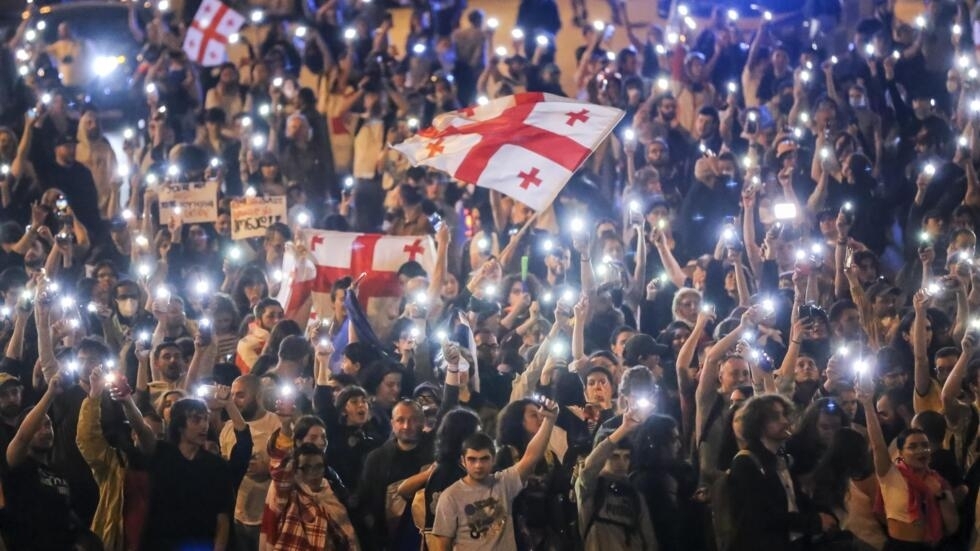
(source: France24)
The British band ‚Massive Attack‘ cancelled their show which would have been held on
28 July in protest of the “government’s attack on basic human rights”.
„In late April, the Shame Movement, a local CSO, wrote to Massive Attack, urging them to acknowledge the “serious and alarming political context” in which their event would take place.
In its letter, the Shame movement cited the Georgian government’s “massive attack” on “Georgia’s civil society, independent media, socially vulnerable groups, LGBTQIA+ community, women, ethnic, religious, and other minorities.”
“Your upcoming performance at the Black Sea Arena – a venue constructed by Ivanishvili and now funded by the state – risks being manipulated as part of the Georgian Dream’s pre-election tactics to divert public attention from pressing issues and obscure these critical concerns during the electoral period,” the Shame movement’s letter to Massive Attack read, adding: “Knowing that Massive Attack champions justice, freedom of expression, civil activism, and LGBTQ+ rights, we ask you to familiarise yourselves with the alarming political climate in Georgia.” (Euronews)
Authors Note: I hope that the protests will be successful in the long-run and that the Georgian youth achieve their goals. Hence I fully support their protests against this bill and the fight for a democratic future. I’m worried, however, how the Georgian government will respond over the next weeks and months and how far they are willing to go to enact this law. However, perhaps more could be achieved – at least regarding the awareness – if there was an international democratically-minded youth organization (in my instance: between Germany and Georgia). Simultaneously serving as a place for cultural exchange. There are likely already structures that could serve as a foundation for this (e.g. the Goethe Institut).
As for South Ossetia, in 1995 autonomy proposals were rejected:
„On 29 March 1994, the OSCE’s Permanent Council shifted the focus of the Mission’s mandate to mediating in the Georgian-South Ossetian conflict.11 In May 1994, the OSCE Mission’s mediation activities made it possible to bring representatives of the Georgian and the South Ossetian conflict parties to the negotiating table for the first time.12 The Mission presented a first draft plan for the future status of South Ossetia as early as September. This proposal, which envisaged granting South Ossetia territorial autonomy within the federal structure of the Georgian state, was, however, rejected by the South Ossetian side. In the spring of 1995, the Mission, with the support of the Russian Federation, produced a new paper on the federal distribution of powers, but this was also rejected by the South Ossetian representatives.“
(p. 6-7, The Georgian-South Ossetian Conflict)
Given the current situation I doubt anything will change, given the deadlock that already existed 29 years ago. As I have no expertise on this issue either, on Abkhazi too, there’s no point in discussing it either. Unfortunately, I don’t know any Georgians, Ossetians or Abkhazians nor any experts so for now that’s all I can offer.
Sources
George II
https://www.britannica.com/biography/George-II-king-of-Great-Britain
What’s the largest U.S. state by area?
https://www.britannica.com/topic/largest-U-S-state-by-area
People of Georgia
https://www.britannica.com/place/Georgia/People
Georgia country profile
https://www.bbc.com/news/world-europe-17301647
Bagrationi dynasty
https://en-academic.com/dic.nsf/enwiki/2517981
History of the Caucasus: Volume 2: In the Shadow of Great Powers
https://books.google.de/books?id=0MLXEAAAQBAJ&pg=PA32&redir_esc=y#v=onepage&q&f=false
George IV of Georgia
https://en.wikipedia.org/wiki/George_IV_of_Georgia
The Amasya Peace Treaty between the Ottoman Empire and Iran (June 1, 1555) and Georgia (PDF, 7 pages long)
http://science.org.ge/old/3-1/Svanidze.pdf
History of Transcaucasia: Russian penetration
https://www.britannica.com/topic/history-of-Transcaucasia/Russian-penetration
The Circassian Genocide: The Forgotten Tragedy of the First Modern Genocide
https://ausisjournal.com/2023/12/06/the-circassian-genocide-the-forgotten-tragedy-of-the-first-modern-genocide/#_edn18
Joseph Stalin
https://www.britannica.com/biography/Joseph-Stalin
Gori, Georgia
https://www.britannica.com/place/Gori
Treaty of Moscow (1920)
https://en.wikipedia.org/wiki/Treaty_of_Moscow_(1920)#cite_note-6
The Georgian-South Ossetian Conflict (PDF, 13 pages long)
https://ifsh.de/file-CORE/documents/yearbook/english/04/Koenig.pdf
The Georgian-Abkhaz conflict in focus
https://www.c-r.org/programme/caucasus/georgian-abkhaz-conflict-focus
Chechnya profile
https://www.bbc.com/news/world-europe-18188085
South Ossetians vote for independence
https://www.theguardian.com/world/2006/nov/13/russia.georgia
EU trade relations with Georgia. Facts, figures and latest developments.
https://policy.trade.ec.europa.eu/eu-trade-relationships-country-and-region/countries-and-regions/georgia_en
Consolidated text: Association Agreement between the European Union and the European Atomic Energy Community and their Member States, of the one part, and Georgia, of the other part
https://eur-lex.europa.eu/legal-content/EN/TXT/?uri=CELEX%3A02014A0830%2802%29-20230306
The European Commission recommends to Council confirming Ukraine, Moldova and Georgia’s perspective to become members of the EU and provides its opinion on granting them candidate status
https://ec.europa.eu/commission/presscorner/detail/en/ip_22_3790
‘We are very strong’: Georgia’s gen Z drives protests against return to past
https://www.theguardian.com/world/article/2024/may/16/georgia-gen-z-drives-protests-against-return-to-past-foreign-agents-law
Protesters throng streets of Georgia’s capital after parliament passes so-called ‘Russian law’
https://apnews.com/article/georgia-parliament-law-foreign-influence-protests-final-66a08ba5ef849b24059ecfcf5420e9f0
Massive Attack cancels show because of Georgia’s attack on ‚basic human rights‘
https://www.euronews.com/culture/2024/06/12/massive-attack-cancels-show-because-of-georgias-attack-on-basic-human-rights
Goethe Institut – Über Uns (in German and Georgian available)
https://www.goethe.de/ins/ge/de/ueb.html
